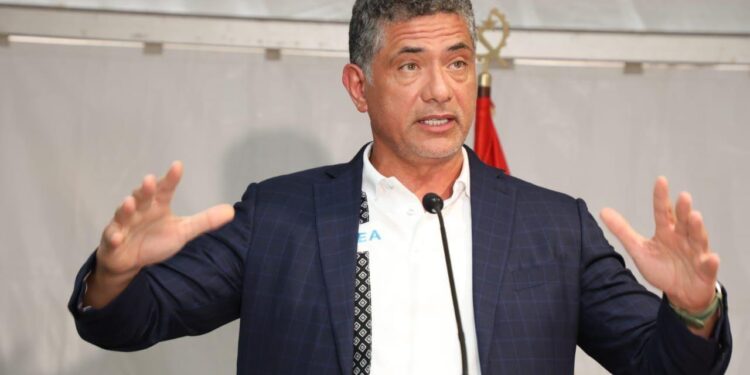The Minister of Energy and Water, João Baptista Borges, emphasized on Thursday, June 20, 2024, in Macau, the importance of the Forum as an opportunity to promote key projects in the Energy and Water subsectors with the financial institutions present, and to hold discussions with government entities from the People’s Republic of China.
Minister’s Full Speech:
Your Excellency, Mr. Ho Iat Seng,
Chief Executive of the Macau Special Administrative Region, People’s Republic of China;
Distinguished Representatives of Diplomatic Missions and International Organizations accredited to the People’s Republic of China;
Esteemed Mr. Fang Qiuchen,
President of the China International Contractors Association;
Executive Directors and Senior Officials of Public, Private, and Financial Institutions;
Allow me, first of all, on behalf of the Executive of the Republic of Angola, to express our profound appreciation for the invitation to participate in the 15th Edition of the International Infrastructure Investment and Construction Forum (IIICF) in Macau/China, under the theme “Green Innovation, Digital Connectivity,” which brings together entrepreneurs from Angola and China, seeking common paths for the social and economic development of our two nations and peoples, with a long tradition of friendship and cooperation.
Secondly, allow me also to congratulate this initiative, which carries great significance for China-Angola relations, taking place at a particularly important moment in the development of our relations, marked by the recent visit of the President of the Republic of Angola to the People’s Republic of China on March 15, which culminated in the signing of several bilateral agreements, including the Agreement on the Promotion and Reciprocal Protection of Investments, a legal framework aimed at promoting greater economic cooperation, stimulating capital flows, and economic development between the two countries.
Your Excellencies, Ladies and Gentlemen:
Today, the world and humanity face immense challenges, particularly in the fields of energy transition and security, water security, innovation, combating climate change, food security, artificial intelligence, demographics, electromobility, and the construction and development of environmentally sustainable cities. These are vital areas for economic, scientific, and business cooperation between Angola and China, involving both the public and private sectors of China.
The People’s Republic of China is a key strategic partner for Angola, with significant involvement in various sectors of our country’s economy, notably in the construction of dams, water supply systems, roads, ports, airports, railways, technology centers, schools, and more. Particularly noteworthy is the ongoing Caculo Cabaça Hydropower Project, which is expected to produce approximately 9,000 MW by 2027.
China’s technical and technological capacity is one of the major advantages that has benefited African countries, particularly in the realm of infrastructure and connectivity, as demonstrated by China’s Belt and Road Initiative, which has promoted industrialization across the African continent with a substantial impact on the implementation of Africa’s 2063 Agenda for sustainable development.
Distinguished entrepreneurs,
Just under a year ago, Angola celebrated the 40th anniversary of the establishment of diplomatic relations with the People’s Republic of China, marking the peak of our cooperative and fraternal relationship. Since the end of the armed conflict, China has played an essential role in Angola’s national reconstruction and development process, and its investment remains indispensable in the Energy and Water sectors and beyond.
Angola, under its 2023-2027 National Development Plan, aligned with the Long-Term Agenda 2050, aims to achieve an installed capacity of 9,000 MW by 2027 and an electrification rate of 60%, with a total investment of approximately USD 23.02 billion. Financial institutions and the private sector are called upon to play a crucial role in achieving these goals, creating opportunities for project financing, direct Chinese investment, the establishment of companies, public-private partnerships, inter-company partnerships, as well as the transfer of technology, equipment, and know-how.
Angola’s investment in the electricity sector remains predominantly public, making it vital for the private sector to view the national electricity sector as a market opportunity, given the country’s industrial potential, regional economic integration, and internal consumption demand, with a total population of around 36 million.
Angola’s energy potential is vast, primarily based on environmentally sustainable and clean sources, estimated at about 60 gigawatts, of which 18 gigawatts come from hydroelectric power and 17 gigawatts from solar energy. Additionally, the country holds an estimated 900 trillion cubic meters of natural gas, with the potential to generate 17 gigawatts of power.
Given Angola’s constitutionally enshrined market-based economic options, the private sector is expected to play a leading role in diversifying the national energy matrix. Therefore, we firmly encourage direct investment in energy production, transmission, distribution, and commercialization concessions, the creation of public-private partnerships, and other forms of business cooperation, particularly joint ventures. Angola has an increasingly promising legal framework for this, including the new Private Investment Law, Public-Private Partnerships Law, Tax Benefits Code, and the Competition Law.
Alongside the electricity sector, let me highlight that the Angolan government continues its best efforts to meet the Sustainable Development Goals (SDG 6), through increased investment in water supply and sanitation infrastructure.
For the 2023-2027 period, the Angolan government plans to invest over USD 4 billion in water supply, with new systems for water capture, treatment, and distribution that will increase the national water supply by 1,149 cubic meters per day, particularly benefiting Luanda, and connect 1.6 million families to the water network.
This financial effort will raise the current per capita water consumption from 40 liters per day to 70 liters, moving Angola closer to meeting the SDGs. As part of these projects and initiatives, the Angolan government has also developed a Drought Mitigation Program for Southern Angola. João Baptista Borges João Baptista Borges João Baptista Borges







